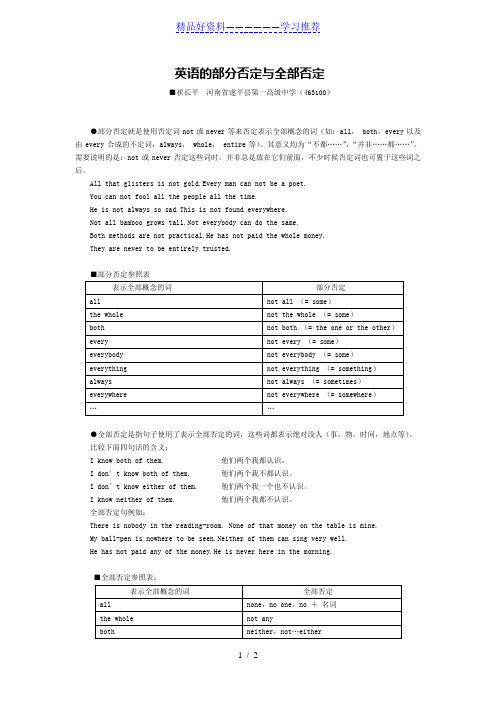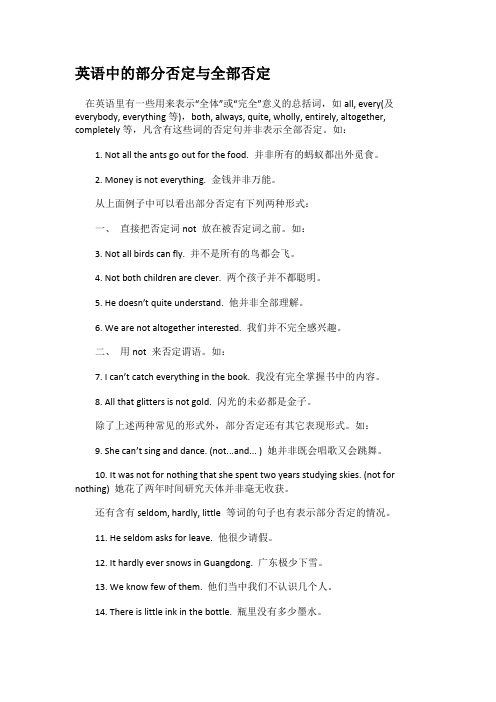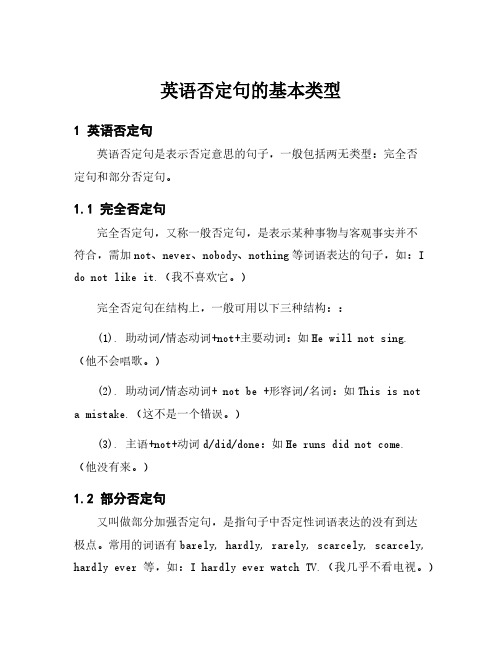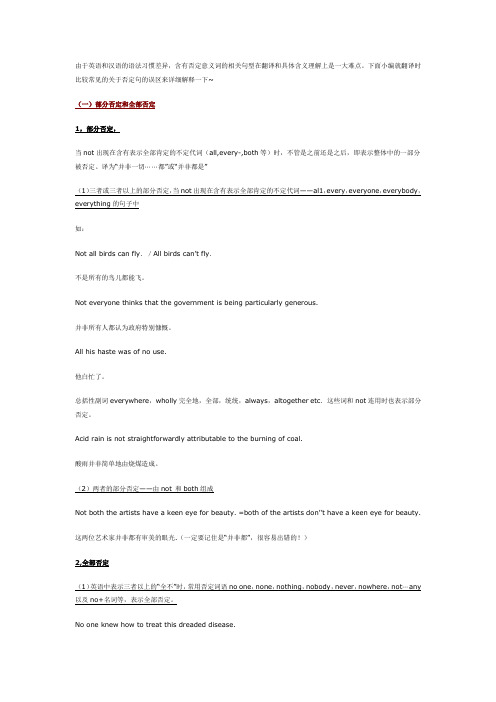部分否定和完全否定[1]
英语的部分否定与全部否定

英语的部分否定与全部否定■崔长平河南省遂平县第一高级中学(463100)●部分否定就是使用否定词not或never等来否定表示全部概念的词(如:all, both,every以及由every合成的不定词,always, whole, entire等)。
其意义均为“不都……”,“并非……都……”。
需要说明的是:not或never否定这些词时,并非总是放在它们前面,不少时候否定词也可置于这些词之后。
All that glisters is not gold.Every man can not be a poet.You can not fool all the people all the time.He is not always so sad.This is not found everywhere.Not all bamboo grows tall.Not everybody can do the same.Both methods are not practical.He has not paid the whole money.They are never to be entirely trusted.■部分否定参照表●全部否定是指句子使用了表示全部否定的词,这些词都表示绝对没人(事,物,时间,地点等)。
比较下面四句话的含义:I know both of them. 他们两个我都认识。
I don′t know both of them. 他们两个我不都认识。
I don′t know either of them. 他们两个我一个也不认识。
I know neither of them. 他们两个我都不认识。
全部否定句例如:There is nobody in the reading-room. None of that money on the table is mine.My ball-pen is nowhere to be seen.Neither of them can sing very well.He has not paid any of the money.He is never here in the morning.■全部否定参照表:。
英语中的部分否定与全部否定

英语中的部分否定与全部否定在英语里有一些用来表示“全体”或“完全”意义的总括词,如all, every(及everybody, everything等),both, always, quite, wholly, entirely, altogether, completely等,凡含有这些词的否定句并非表示全部否定。
如:1. Not all the ants go out for the food. 并非所有的蚂蚁都出外觅食。
2. Money is not everything. 金钱并非万能。
从上面例子中可以看出部分否定有下列两种形式:一、直接把否定词not 放在被否定词之前。
如:3. Not all birds can fly. 并不是所有的鸟都会飞。
4. Not both children are clever. 两个孩子并不都聪明。
5. He doesn’t quite understand. 他并非全部理解。
6. We are not altogether interested. 我们并不完全感兴趣。
二、用not 来否定谓语。
如:7. I can’t catch everything in the book. 我没有完全掌握书中的内容。
8. All that glitters is not gold. 闪光的未必都是金子。
除了上述两种常见的形式外,部分否定还有其它表现形式。
如:9. She can’t sing and dance. (not...and... ) 她并非既会唱歌又会跳舞。
10. It was not for nothing that she spent two years studying skies. (not for nothing) 她花了两年时间研究天体并非毫无收获。
还有含有seldom, hardly, little 等词的句子也有表示部分否定的情况。
11. He seldom asks for leave. 他很少请假。
高考英语中的八种否定形式

高考英语中的八种否定形式(一)完全否定英语中的完全否定可以用not, no, never, none, nobody, nothing, neither...nor, nowhere等表示。
如:1.Nothing is difficult for him. 没什么难得到他。
2.Mary never has beef. 玛丽从来不吃牛肉。
3.Neither answer is correct. 两种答案都不对。
(二)部分否定英语中表示“全体”意义的代词,形容词或副词。
如:all, both, altogether, always, completely, every day, everyone, everything, everywhere, every, everybody, many, often等与not搭配时,通常表示部分否定,意思是“并非都是”、“不完全是”、“不是每个都是”等。
例如:1.Not everyone was amused by these April Fool's jokes.并不是每个人都觉得这些玩笑有趣。
2.Food likes and dislikes do not always seem related to nutrition.对食物的好恶似乎并不总与营养有关。
比较:Nothing makes him happy.(全部否定)没有哪一件事情让他开心。
Not everything makes him happy.(部分否定)并不是每一件事都让他开心。
None of the students went to visit the science museum last week.(完全否定)上周没有一个学生去参观科技博物馆。
Not all of the students went to visit the science museum last week.(部分否定)上周并不是所有的学生都去参观了科技博物馆。
部分否定、全部否定和混合否定用法解析

部分否定、全部否定和混合否定用法解析英语否定句部分否定、全部否定和混合否定用法解析一、部分否定all,both,every,everybody,everyday,everyone,many,everything,entirely,each、altogether,absolutely,wholly,completely,everywhere,always,often等与否定词not搭配使用。
常常翻译为“并非所有,并不是都。
如:all…not (不全是,不都是),both…not(并非两个都,不是两者都),every…not(不是每个都),not always(不总是,不一定),not often(不经常),not altogether(不全是),not necessarily (未必)等。
We couldn't eat in a restaurant because none of us had any money on us我们不能在饭店吃饭,因为我们谁都没有带钱。
All that glitters is not gold. (莎士比亚语)=Not all that glitters is gold. 闪闪发光的未必都是金子。
Both the windows are not open.两扇窗户并不都是开着的。
Everybody does not believe the rumor.并不是每个人都听信这个谣言的。
They are not always in the office on Sundays.他们不一定每个星期天都在办公室。
The responsibility is not altogether mine.责任并不全在于我身上。
The situation is not necessarily so.情况并非如此。
I agree with most of what you said, but I don't agree with everything.我同意你所说的大部分话,但是我不同意你所说所有话。
英语否定句的基本类型

英语否定句的基本类型1 英语否定句英语否定句是表示否定意思的句子,一般包括两无类型:完全否定句和部分否定句。
1.1 完全否定句完全否定句,又称一般否定句,是表示某种事物与客观事实并不符合,需加not、never、nobody、nothing等词语表达的句子,如:I do not like it.(我不喜欢它。
)完全否定句在结构上,一般可用以下三种结构::(1). 助动词/情态动词+not+主要动词:如He will not sing.(他不会唱歌。
)(2). 助动词/情态动词+ not be +形容词/名词:如This is nota mistake.(这不是一个错误。
)(3). 主语+not+动词d/did/done:如He runs did not come.(他没有来。
)1.2 部分否定句又叫做部分加强否定句,是指句子中否定性词语表达的没有到达极点。
常用的词语有barely, hardly, rarely, scarcely, scarcely, hardly ever等,如:I hardly ever watch TV.(我几乎不看电视。
)部分否定句在结构上,也有三种:(1). 助动词/情态动词+hardly / scarcely/ rarely(almost不常用)+动词原形:如He can hardly speak English.(他几乎不会说英语。
)(2). 主语+hardly/scarcely/rarely(almost不常用)+动词过去式:如She rarely visited the park.(她很少去公园。
)(3). 主语+have/has+hardly/scarcely/rarely(almost不常用)+过去分词:如I have hardly taken the exam.(我几乎没参加过考试。
)以上就是英语中完全否定句和部分否定句的基本类型,当然还有很多否定句的表达方式,都是因人而异。
否定词基础知识

否定词基础知识否定词在语言表达中扮演着重要的角色,可以用来否定陈述、疑问或命令等。
掌握否定词的基础知识对于学习语言和正确认识表达意思至关重要。
本文将为大家介绍否定词的各种类型以及使用注意事项。
一、否定词的分类1. 完全否定词:表示完全否定的词语。
例如:不、没、无、非、未等。
2. 半否定词:表示部分否定的词语。
例如:稍微、有点儿、不大、不算等。
3. 否定疑问词:用于构成否定疑问句,即在疑问句中表达否定的词语。
例如:难道不、不是吗、岂不等。
二、完全否定词的使用完全否定词是用来表示完全否定的词语,常用的完全否定词有“不”、“没”、“无”、“非”、“未”等。
1. “不”的用法(1) 在动词前使用,表示不进行某个动作。
例如:不吃、不走、不喝。
(2) 在形容词前使用,表示不具备某种特征。
例如:不高、不美、不快乐。
(3) 在“是”的后面使用,表示不是某个状态。
例如:不是、不在。
(4) 在名词前使用,表示不是某个概念或身份。
例如:不学生、不老师。
2. “没”的用法(1) 表示缺乏、不存在某种事物。
例如:没钱、没时间、没机会。
(2) 在动词前使用,表示没有进行某个动作。
例如:没吃、没看、没听。
3. “无”的用法(1) 表示没有、不具备某种事物。
例如:无法、无力、无聊。
(2) 在名词前使用,表示没有某种概念。
例如:无人、无情。
4. “非”的用法(1) 表示某种反义或不同于某种状态。
例如:非法、非常、非黑即白。
(2) 表示拒绝、否定。
例如:非要、非得、非此即彼。
5. “未”的用法(1) 表示没有做某个动作。
例如:未来、未完成、未知。
(2) 在动词前使用,表示没有进行某个动作。
例如:未见、未闻、未晚。
三、半否定词的使用半否定词是用来表示部分否定的词语,常用的半否定词有“稍微”、“有点儿”、“不大”、“不算”等。
半否定词通常与程度状语搭配使用,表示程度的大小。
例如:“稍微”表示程度较轻:稍微有点儿累;稍微有点儿热。
“有点儿”表示稍微超过正常程度:有点儿困;有点儿生气。
Affirmative & Negative(1)

He’s too much of a coward to do that. 他太怯懦了,干不了那件事。 He is more brave than wise. 他有勇无谋。 This house is more like a school than a church. 这所房子与其说像教堂,不如说像学校。 He was wiser than to have done such a thing. 他不至于愚蠢得竟然做出这样的事情。
注意:并非所有这种相似含义的动词都能 用于否定转移结构,assume(设想)、 surmise(推测)、presume(假设,推定) 等词就不用于否定转移。 They don’t assume that Tom came. 他们不相信汤姆来了。 They assume that Tom didn’t come. 他们相信汤姆没有来。
It just didn’t seem that it would rain. 就是看不出来天会下雨。 I didn’t ever suppose they were happy. 我从来不认为他们幸福。 I wouldn’t have imagined that he would be here. 我从不曾想到他会在这儿。
4. 特指否定(Special Negation)
否定谓语动词称为一般否定(General Negation),否定非谓语成分(即除谓语以外 的其他成分,否定的仅是一个方面)称为 特指否定或局部否定(Local Negation)。 They are allowed not to go swimming. 允许他们不去游泳。 He came to work not by bus, but on foot. 他不是坐车,而是步行上班的。
“否定”的翻译 (3)

由于英语和汉语的语法习惯差异,含有否定意义词的相关句型在翻译和具体含义理解上是一大难点。
下面小编就翻译时比较常见的关于否定句的误区来详细解释一下~(一)部分否定和全部否定1,部分否定,当not出现在含有表示全部肯定的不定代词(all,every-,both等)时,不管是之前还是之后,即表示整体中的一部分被否定。
译为“并非一切⋯⋯都”或“并非都是”(1)三者或三者以上的部分否定,当not出现在含有表示全部肯定的不定代词——al1,every,everyone,everybody,everything的句子中如:Not all birds can fly./All birds can’t fly.不是所有的鸟儿都能飞。
Not everyone thinks that the government is being particularly generous.并非所有人都认为政府特别慷慨。
All his haste was of no use.他白忙了。
总括性副词everywhere,wholly完全地,全部,统统,always,altogether etc.这些词和not连用时也表示部分否定。
Acid rain is not straightforwardly attributable to the burning of coal.酸雨并非简单地由烧煤造成。
(2)两者的部分否定——由not 和both组成Not both the artists have a keen eye for beauty. =both of the artists don’’t have a keen eye for beauty.这两位艺术家并非都有审美的眼光.(一定要记住是“并非都”,很容易出错的!)2,全部否定(1)英语中表示三者以上的“全不”时,常用否定词语no one,none,nothing,nobody,never,nowhere,not⋯any 以及no+名词等,表示全部否定。
- 1、下载文档前请自行甄别文档内容的完整性,平台不提供额外的编辑、内容补充、找答案等附加服务。
- 2、"仅部分预览"的文档,不可在线预览部分如存在完整性等问题,可反馈申请退款(可完整预览的文档不适用该条件!)。
- 3、如文档侵犯您的权益,请联系客服反馈,我们会尽快为您处理(人工客服工作时间:9:00-18:30)。
若要表示全部否定,则应用相 应的表示全部否定的否定词。
all → none (一个人也没有、没有 任何东西), both → neither (两个都不), every → no,
everyone → no one(nobody),
everything → nothing 等。
其他否定形式
1. 借助否定词not,no,never,none, nobody,nothing,nowhere等来表达 否定之意. 2. 借助半否定词hardly,scarcely, seldom,little,few等来表达否定之意. 3. 借助否定前缀a-,ab-,an-,de-, dis-,il-,im-,in-达否定之意; 也可以用后缀 -less,-free,-proof等 构成的词表达否定之意。
______ likes money, but money is not _________ .
A.Everyone; everything B.Anyone; anything C.Someone; nothing D.Nobody; everything
部分否定和全部否定 1.Not all birds can fly. =All birds can not fly =Some birds can’t fly 不是所有的鸟都会飞
三、 every…的否定式:"不是每…… 都……" Not every book is educative. (或: Every book is not educative.) Not everyone likes this book. This flower is not seen everywhere. 四、 always的否定式:“并非总是(并 非一直)……” He is not always so sad.
他们我都不认识。
2) I like neither of the books.
这两本书我都不喜欢。 3)No student goes to the farm on Sundays. 星期天没有学生去农场。
4) No one/ Nobody in our class likes football.
我们班没有人喜欢足球。
若要表示全部否定,则应用相应 的表示全部否定的否定词。
all → none (一个人也没有、没有任何东 西), both → neither (两个都不),
every → no,
everyone → no one(nobody), not anybody
everything → nothing ; not anything 等。
I agree with most of what you said ,but I don’t agree with ___. A everything B anything C something D nothing 解析 :受否定句影响,迷惑选项为B。此 题语境性极强,第一句中的most of what you said为关键点,你所说的大部分我都同 意但不是所有的我都同意。因此答案为A
2 -- Which of the two computer games did you prefer? -- Actually I don’t like___. A both of them B either of them C none of them D neither of them 解析: 根据题是;这两个网络游戏你喜欢哪 一个? 说实话我两个都不喜欢。not 和both 连用表示部分否定。none指三者以上的否 定,neither指两者都不,前面有don’t,就 不能再和neither搭配使用了。答案为B
解释下列句子 1.Not all men can swim. =All men can not swim.
2.Not all Chinese people like beef. =All Chinese people don’t like beef. 3.I don’t kown all of them. =I only know some of them,not all.
—Shall we go to the restaurant opposite the supermarket for dinner? —No, it's the _____ place I'd like to go to. A.worst B.best C.last D.first
1)I know none of them.
英语中的部分否定(即不完全否定) 一、 all 的否定式:not all…(或: all…not)表示\"并非都……\"、\"不是所 有的都……\“ Not all men can be masters. (= All men cannot be masters.) Not all bamboo grows tall. 二、 both 的否定式:not…both (或: both… not) \"并非两个……都……\" I don\'t want both the books. Both (the) windows are not open.
1)All of them can do it. --- None of them can do it. 2)Both are good. ---Neither is good. 3)Everybody likes it. ---Nobody likes it. 4)He is always late. --- He is never late. 5)We don't trust them entirely. --- We never trust them at all. 6) He was here all the time. --- He was never here.
七、 not…and…的否定式,被否定的 往往是and后面的那一部分。 He did not speak clearly and correctly. 他讲得清楚但不正确。 This film is not interesting and instructive. 这部电影有趣但无教育意义。 如果将and 换成or,not 对其后面的两 部分就全盘否定了。 He did not speak clearly or correctly.
变否定句
1 I agree with most of what you said ,but I don’t agree with ___. A everything B anything C something D nothing 2 -- Which of the two computer games did you prefer? -- Actually I don’t like___. A both of them B either of them C none of them D neither of them
有全体意义的代词和副词 all , every (及派生词).both ,always 等,它们用于否 定结构,只表示部分否定. 应译作 “一 切……不都是”或 “并非一切…都 是” 。
1) I don't know all of them. 我并不全认识他们。 2) I don't like both of the books. 这两本书我并不都喜欢。 3) Not every student goes to the farm on Sundays. 并非每个学生星期天都去农场。 4) Not everyone in our class likes football. 在我们班并非每个人都喜欢足球。
1.“All the students don‟t work hard.” means “_________” A.Not all the students work hard. B. Every student works hard. C. None of the students works hard. D. All of the above. 2. —The exam was too difficult, wasn‟t it? —Yes, I don‟t think ______ could pass it. A.somebody B. anybody C. nobody D. everybody
________ else in the world ________ in London can you experience 4 seasons in a single day. A. Everywhere, rather than B. Everywhere, other than C. Nowhere, rather than D. Nowhere, other than ---Don‟t you feel cold, Tim? You wear such a jacket in a day at -5℃. ---___________.I‟m boiling. A.No worry B.Take it easy C.Not in the least D.That‟s OK --- Isn‟t your uncle an engineer? --- _______. (MET83) A.No, he isn‟t B. No, he is C. Yes, he isn‟t D. Yes, he does —You haven‟t been to Beijing, have you? —________. How I wish to go there! (NMET98) A. Yes, I have B. Yes, I haven‟t C. No, I have D. No, I haven‟t
—You‟re not a new member, are you ? (MET87) —_______, I joined only yesterday. A. No, I‟m not B. Yes, I‟m not C. No, I am D. Yes , I am —Please don‟t make a noise. —_______. I‟ll be as quiet as a mouse. (MET92) A. Yes, I won‟t B. No, I won‟t C. No, I will D. Yes, I will Don‟t smoke in the meeting room, _______?(MET91) A. do you B. will you C. can you D. could you
